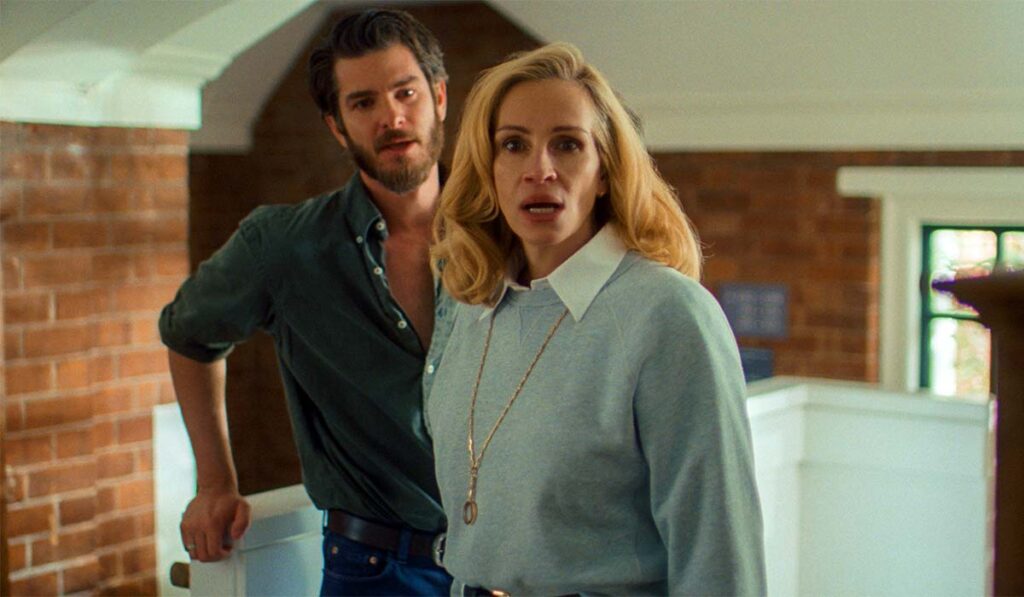Despite star-studded cast, After the Hunt fails to deliver
Luca Guadagnino’s After the Hunt had the potential to be one of the year’s best films, but ultimately falls short.
Luca Guadagnino’s After the Hunt had the potential to be one of the year’s best films, but ultimately falls short.

After making two features in 2024, Italian director Luca Guadagnino returns to the big screen with his sole directorial project of 2025. After the Hunt focuses on Alma (Julia Roberts), a Yale philosophy professor on the cusp of tenure. Alma’s star Ph.D. student, Maggie (Ayo Edebiri), accuses Alma’s colleague and friend, Hank (Andrew Garfield), of sexually assaulting her after a party at Alma’s house.
The film never truly resolves the question of Hank’s guilt or innocence, and does a wonderful job throughout two hours and 19 minutes of establishing the unreliability of each character. We are first presented with these pristine images of the respective players, and the movie slowly unravels each character’s less-than-ideal traits. Frankly, the only likeable character by the end of the film is Katie (Thaddea Graham) — who has just a few minutes of screen time — which she spends getting berated by a stressed Alma for asking questions during a lecture.
The first two-thirds of the film build up an intriguing plot with deliberate pacing. However, After the Hunt comes up short, crumbling in the final act. The ambiguous ending is fairly innocuous, but not rewarding enough.
After the Hunt’s epilogue, set five years after the events depicted in the film, felt largely unnecessary. Alma is now the dean of Yale, Hank is working for a politician and Maggie is just … older. She remains not quite healed, especially from the hurt Alma inflicted upon her, but able to at least partially move on. The conclusion, the only part of the script Guadagnino changed, was the weakest portion of the film.
The topic of sexual assault will always be socially relevant; it’s as heinous a violation one can commit against another human being. While the subject was taboo in cinema for a long time, it’s no longer a new topic. And frankly, After the Hunt did not provide a compelling enough angle to say anything substantive.
Many of the high-brow, academic conversations had in the film are very surface-level, especially given how far societal attitudes have come in the wake of the #MeToo movement. Had this movie come out five-to-eight years ago, it probably would have moved the needle. Yet unfortunately, the script reads like it’s trying to push forward a conversation that has already been had.
It’s difficult not to draw comparisons between After the Hunt and John Patrick Shanley’s Doubt, the story of a nun who believes a priest is having an inappropriate relationship with an altar boy. Doubt also contains an ambiguous ending, as you never truly find out if Father Flynn committed the acts he’s accused of. But it’s an ending that’s powerful, one where you find yourself staring at the credits for several minutes after they begin to roll. Meanwhile, After the Hunt’s ending just doesn’t land the same.
This film definitely has the vibe of Oscar-baiting, a phenomenon where certain arthouse flicks appear to be deliberately crafted to win Academy Awards. One glaring area where it should find itself in Oscar talks, however, is sound design. After the Hunt’s sound designers play brilliantly with ticking clocks, building up to the inciting incident like a bomb ready to blow. There’s a scene where Alma’s husband, Frederik (Michael Stuhlbarg), is coming in and out of a swinging door while Alma and Maggie have a conversation, with classical music playing in the other room. The sound design is the star of that scene, representing just one example of the movie’s masterclass in sound.
Malik Hassaan Sayeed returns to the feature film game as the cinematographer of After the Hunt, to great success. The movie is adorned with impressive and effective camera shots.
Roberts, Edebiri and Garfield all shine throughout After the Hunt, as to be expected. All three actors play both internally conflicted and outwardly self-preserving characters, and their performances greatly increase the thematic tension. Roberts’ big return to the silver screen is as poignant as ever, Edebiri continues to establish herself as a rising star and Garfield channels his performance in The Social Network by turning the chaos up a notch.
After the Hunt also plays heavily with the theme of a generational divide. By the end of the film, Alma resents Maggie for her sociopolitical perspective as a wealthy Gen Z doctoral student. To Alma, Maggie has everything handed to her and expects things to be comfortable. Meanwhile, Alma sees herself as a woman who has built her career up from nothing. Maggie originally seeks Alma out for mentorship, seeing her as a strong woman with a history of supporting other women in their male-dominated field.
For a movie that had so much going for it, After the Hunt fumbled on the one-yard line. It’s a film that had the potential to be one of the best of the year, even a standout for the decade. Instead, we were left thinking about what could have been.
